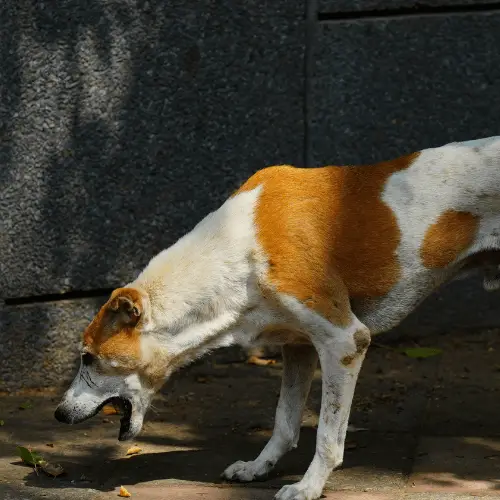As a dog owner, I know how concerning it can be when our furry friends experience diarrhea and vomiting. In this article, I’ll share my knowledge and experience on how to care for a dog with these symptoms, including causes, treatment options, and when to seek veterinary care.

Symptoms of Diarrhea and Vomiting in Dogs
When my dog first experienced diarrhea and vomiting, I noticed several symptoms that indicated something was wrong:
- Intermittent episodes of vomiting and diarrhea: My dog would vomit and have diarrhea several times a day.
- Foamy, yellowish bile in vomit: I noticed that the vomit contained a yellowish, foamy bile, especially after my dog’s stomach was empty.
- Dry heaving or gagging: My dog would dry heave or gag after eating or drinking.
- Large volumes of diarrhea: The diarrhea was produced several times a day and had a soft-serve ice cream-like consistency.
- Reduced appetite: My dog’s appetite decreased significantly during this time.
It’s essential to monitor your dog’s condition and consult a veterinarian if the symptoms persist or worsen. In the following sections, I’ll discuss the possible causes, treatment options, and when to seek professional help.
Causes of Diarrhea and Vomiting in Dogs

As a dog owner, I’ve learned that there are various factors that can cause diarrhea and vomiting in dogs. Some of the most common causes include:
- Infections: Bacterial, viral, fungal, or parasitic infections can lead to gastrointestinal issues in dogs.
- Dietary issues: Consuming spoiled food, abrupt changes in diet, or food intolerances can cause diarrhea and vomiting.
- Stress and anxiety: Emotional stress or anxiety can trigger gastrointestinal problems in dogs.
- Toxins: Ingesting toxic substances, such as poisonous plants or household chemicals, can cause diarrhea and vomiting.
- Underlying medical conditions: Organ failure, diabetes, inflammatory bowel disease, and intestinal obstruction are some examples of medical conditions that can cause gastrointestinal symptoms in dogs.

Dehydration and Electrolyte Imbalances
Do you know how long a dog can go without peeing?
When my dog experienced diarrhea and vomiting, I quickly realized the importance of addressing dehydration and electrolyte imbalances. Here’s what I learned:
- Dehydration: Diarrhea and vomiting can cause a dog to lose significant amounts of water, leading to dehydration. Signs of dehydration include sunken eyes, dry gums, and skin that doesn’t bounce back when pinched.
- Electrolyte imbalances: Along with water loss, diarrhea and vomiting can also cause imbalances in essential electrolytes, such as sodium, potassium, and chloride.
To help my dog stay hydrated and maintain electrolyte balance, I made sure they had access to fresh, clean water at all times. I also offered diluted electrolyte solutions, like unflavored Pedialyte, to help replace lost electrolytes.
Treatment Options for Diarrhea and Vomiting in Dogs
When my dog was dealing with diarrhea and vomiting, I learned about various treatment options that could help alleviate their symptoms:
- Consult a veterinarian: It’s crucial to consult a veterinarian for a proper diagnosis and treatment plan. They may recommend medications, dietary changes, or further testing to determine the underlying cause.
- Bland diet: Feeding your dog a bland diet can help soothe their upset stomach. Some options include:
- Boiled chicken or white fish
- Brown rice, wholemeal pasta, or potatoes
- Hydration: Ensure your dog has access to fresh, clean water at all times to prevent dehydration. You may also offer diluted electrolyte solutions to help maintain their electrolyte balance.
- Dietary polyphenols supplementation: Some studies suggest that dietary polyphenols supplementation may help manage acute diarrhea in dogs. However, consult your veterinarian before introducing any supplements to your dog’s diet.

Dietary Considerations for Dogs with Diarrhea and Vomiting
When my dog was recovering from diarrhea and vomiting, I learned about the importance of providing a balanced diet to support their recovery:
- Choose a reputable dog food brand: Feeding your dog a balanced diet from a reputable company can help ensure they receive the necessary nutrients[3].
- Introduce new foods gradually: If you need to change your dog’s diet, do so gradually to avoid upsetting their stomach further.
- Monitor your dog’s food intake: Keep an eye on your dog’s appetite and food intake during their recovery. If they continue to refuse food or show signs of worsening symptoms, consult your veterinarian.
Remember, it’s essential to monitor your dog’s condition and consult a veterinarian if the symptoms persist or worsen.
Preventing Diarrhea and Vomiting in Dogs
As a responsible dog owner, I’ve learned that prevention is key when it comes to diarrhea and vomiting in dogs. Here are some tips to help prevent these issues:
- Maintain a healthy diet: Feed your dog a balanced diet from a reputable company to ensure they receive the necessary nutrients.
- Introduce new foods gradually: If you need to change your dog’s diet, do so gradually to avoid upsetting their stomach.
- Proper vaccination: Keep your dog’s vaccinations up-to-date to protect them from infectious diseases that can cause diarrhea and vomiting.
- Stress management: Provide a calm and comfortable environment for your dog to reduce stress and anxiety, which can trigger gastrointestinal problems.
- Avoid toxic substances: Keep toxic substances, such as poisonous plants and household chemicals, out of your dog’s reach.
When to Seek Veterinary Care
It’s essential to know when to seek veterinary care for a dog with diarrhea and vomiting. Here are some guidelines based on my experience:
- Persistent symptoms: If your dog’s diarrhea and vomiting persist for more than 24 hours, it’s time to consult a veterinarian.
- Lethargy: If your dog becomes lethargic or shows signs of weakness, it could indicate a more serious issue that requires veterinary attention.
- Black or tarry diarrhea: Black or tarry diarrhea can be a sign of internal bleeding, which requires immediate veterinary care.
- Blood in vomit or stool: If you notice blood in your dog’s vomit or stool, consult a veterinarian as soon as possible.
Remember, always monitor your dog’s condition and consult a veterinarian if the symptoms persist or worsen. Your dog’s health and well-being should always be a top priority.
Conclusion
As a dog owner who has dealt with my dog’s diarrhea and vomiting, I understand how distressing it can be to see our furry friends suffer. By following the guidelines and tips I’ve shared in this article, you can better care for your dog during these challenging times:
- Monitor symptoms: Keep an eye on your dog’s condition and watch for any changes or worsening symptoms.
- Consult a veterinarian: Seek professional help if symptoms persist or worsen, or if you notice any alarming signs like lethargy or blood in vomit or stool.
- Hydration and electrolyte balance: Ensure your dog stays hydrated and maintains a proper electrolyte balance during their recovery.
- Dietary considerations: Provide a bland diet and gradually reintroduce regular food as your dog recovers.
- Prevention: Take steps to prevent diarrhea and vomiting in your dog by maintaining a healthy diet, proper vaccination, and stress management.
Remember, your dog’s health and well-being should always be a top priority. By being proactive and attentive, you can help your dog recover from diarrhea and vomiting and get back to their happy, healthy selves.
Frequently Asked Questions
- What are the common causes of diarrhea and vomiting in dogs?
- Infections, dietary issues, stress, toxins, and underlying medical conditions can cause diarrhea and vomiting in dogs.
- How can I tell if my dog is dehydrated due to diarrhea and vomiting?
- Signs of dehydration include sunken eyes, dry gums, and skin that doesn’t bounce back when pinched.
- When should I take my dog to the vet for diarrhea and vomiting?
- Consult a veterinarian if symptoms persist for more than 24 hours, your dog becomes lethargic, or you notice blood in their vomit or stool.
- Can certain foods cause diarrhea and vomiting in dogs?
- Yes, consuming spoiled food, abrupt changes in diet, or food intolerances can cause diarrhea and vomiting.
- Are there any home remedies for treating diarrhea and vomiting in dogs?
- Providing a bland diet, ensuring proper hydration, and offering diluted electrolyte solutions can help alleviate symptoms.
- How long does it typically take for a dog to recover from diarrhea and vomiting?
- Recovery time varies depending on the cause and severity of the symptoms, but most dogs improve within 24-48 hours with proper care.
- Can diarrhea and vomiting in dogs be contagious to other pets or humans?
- Some causes of diarrhea and vomiting in dogs, such as certain infections, can be contagious to other pets or humans.
- What are the potential complications of untreated diarrhea and vomiting in dogs?
- Untreated diarrhea and vomiting can lead to dehydration, electrolyte imbalances, and more severe health issues.
- How can I prevent diarrhea and vomiting in my dog?
- Maintain a healthy diet, proper vaccination, stress management, and keep toxic substances out of your dog’s reach.
- Are there any over-the-counter medications that can help with diarrhea and vomiting in dogs?
- Consult your veterinarian before giving your dog any over-the-counter medications, as they may not be suitable for your dog’s specific condition.
- Can stress or anxiety cause diarrhea and vomiting in dogs?
- Yes, emotional stress or anxiety can trigger gastrointestinal problems in dogs.
- How can I help my dog stay hydrated during bouts of diarrhea and vomiting?
- Ensure your dog has access to fresh, clean water at all times and offer diluted electrolyte solutions to help maintain their electrolyte balance.
- What should I feed my dog when they have diarrhea and vomiting?
- A bland diet consisting of boiled chicken or white fish, and brown rice, wholemeal pasta, or potatoes can help soothe your dog’s upset stomach.
- Are there any specific breeds of dogs more prone to diarrhea and vomiting?
- Diarrhea and vomiting can affect any dog breed, but some breeds may be more susceptible to certain underlying causes.
- Can puppies and senior dogs experience more severe symptoms of diarrhea and vomiting?
- Puppies and senior dogs may have weaker immune systems, making them more susceptible to complications from diarrhea and vomiting.
- How do I clean and disinfect my home after my dog has had diarrhea and vomiting?
- Clean affected areas with a pet-safe disinfectant and wash any soiled bedding or toys to prevent the spread of infection.
- Can vaccinations or medications cause diarrhea and vomiting in dogs?
- Some vaccinations or medications can cause temporary gastrointestinal side effects, including diarrhea and vomiting.
- Are there any warning signs that my dog’s diarrhea and vomiting may be caused by a more serious condition?
- Persistent symptoms, lethargy, blood in vomit or stool, or black/tarry diarrhea can indicate a more serious condition requiring veterinary attention.
- How can I help my dog feel more comfortable while they are experiencing diarrhea and vomiting?
- Provide a calm and comfortable environment, ensure proper hydration, and offer a bland diet to help soothe your dog’s upset stomach.
- Can diarrhea and vomiting in dogs be a sign of an underlying medical condition?
- Yes, diarrhea and vomiting can be symptoms of various underlying medical conditions, such as organ failure, diabetes, or inflammatory bowel disease.
Hi, I’m John and I love dogs. Ever since I was a kid, I always wanted to have a furry friend by my side. I grew up with a golden retriever named Max, who taught me a lot about loyalty, friendship, and fun. He was my best buddy for 12 years, and I miss him every day.
